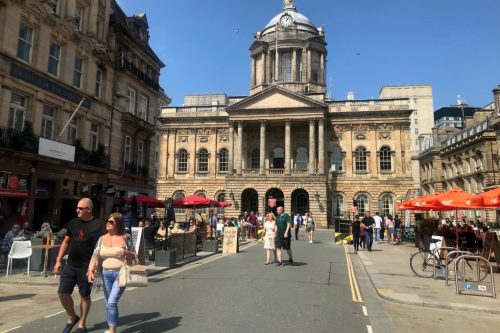Liverpool Without Walls generates £9m of extra revenues

A scheme to promote the hospitality industry in Liverpool during the first lockdown has generated £8.9m in revenues and protected hundreds of jobs in the city’s restaurants and bars sector.
The Liverpool Without Walls (LWW) scheme was the first of its kind in the country and was launched in June when the city council announced a £450,000 fund to help local small to medium-sized businesses redesign outdoor spaces and turn them into high-quality, covered seating areas.
This made up for the internal space they lost as a result of social distancing restrictions.
Support was given to 88 businesses and new figures show that from July 20, to September 25, the scheme generated additional sales of £8.9m that would not have otherwise been delivered, and for every £1 invested, it brought £20 back in to the local economy.
Restaurants, cafes and bars were able to cater for a further 2,723 covers and the majority of venues were able to bring staff back off furlough.
On average, covers increased by 42% and for some smaller venues the outside area actually increased the capacity they had prior to the social distancing requirements. In total, 1,617 additional seats were created.
As well as the grant funding they were given free trading permits, road closures enabled their seating to spill out on to the streets and architecturally-designed parklets were installed on Bold Street.
The scheme focused on three main hospitality areas, Bold Street, Castle Street and Lark Lane, and was led by the city council in partnership with Liverpool BID Company and Liverpool Chamber of Commerce.
When giving feedback to the scheme, 95% were satisfied with LWW, 82% of venues believed it had increased sales, and 64% felt the scheme had made it viable for them to reopen.
Feedback from businesses included: “The idea was right for the time and showed imagination”; “Without it, we may have needed to close the business”; “A great initiative that literally saved our bacon.”
Since the research was carried out, a further 23 businesses have received grant funding, taking the total number of businesses which have been supported by Liverpool Without Walls to 111.
The money for Liverpool Without Walls came from existing budgets, by re-purposing capital spending to give businesses practical support for the COVID-19 emergency and alleviate the impact on the local economy.
“The evaluation of the scheme has been carried out independently by Liverpool City Region Combined Authority.
Liverpool’s Acting Mayor and cabinet member for culture, tourism and events, Cllr Wendy Simon, said: “Liverpool Without Walls is an example of this city at its very best – in the midst of a crisis, partners came together quickly to develop a programme that would support our hard-hit hospitality sector.
“The hospitality industry employs 50,000 people and contributes more than £4bn to the local economy each year, so doing nothing was not an option.
“The ethos was simple – we had to protect the sector and do so in a COVID-safe manner which would give visitors the confidence to return once again.
“The project was a huge learning curve with a massive amount of hard work behind it, and I’m immensely proud to know that not only did it succeed, it surpassed our expectations. Millions of pounds were generated and I’m sure as a result, businesses could see some light at the end of this very dark tunnel.”
She added: “I’d like to thank all those city partners who worked so hard behind the scenes, the businesses who embraced something new and, of course, the thousands of people who returned to our restaurants, bars and cafes and made Liverpool Without Walls such a success.”
Liverpool BID Company chief executive, Bill Addy, said: “Our hospitality sector has been one of the hardest hit by this pandemic and without the support and enthusiasm for Liverpool Without Walls, it could have been much worse.
“Our public spaces are a vital part of our city, and became increasingly so in the Summer as we worked to rebuild the economy after the national lockdown.
“Making the city work for our businesses, but also making the public realm attractive and engaging for our visitors and diners, is incredibly important. This project will likely have a long lasting impact and illustrates how life-changing it is when our businesses and city partners come together to benefit us all.”
Peter Kinsella, owner of Lunya, which has eateries in Liverpool One and Albert Dock, said: “The Liverpool Without Walls funding made a huge difference to both of our restaurants.
“At a time when we were desperately short of cash, the funding enabled us to expand the covers in our terraces which provided our guests with a much better outside experience and, more importantly, enabled us to generate much-needed revenue from the outside space.
“It was a lifesaver for the business and we are delighted with the support.”








